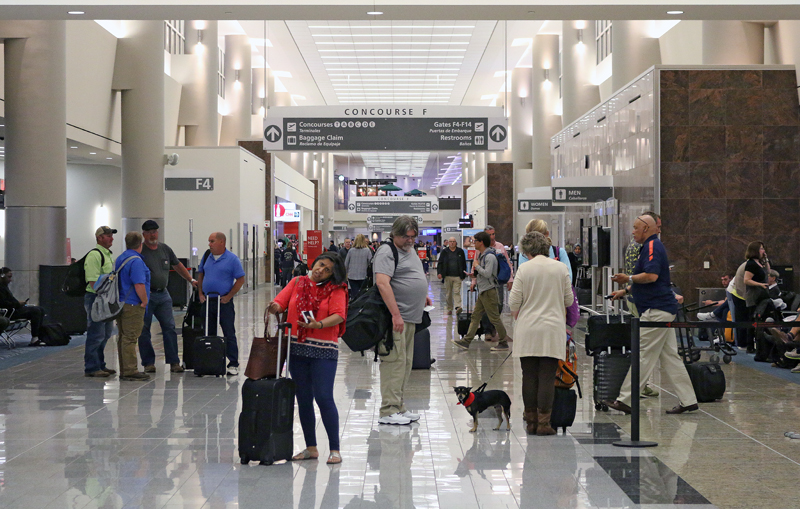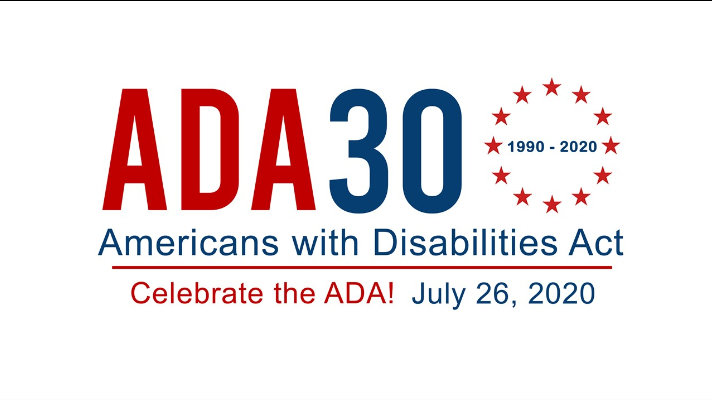The Americans with Disabilities Act — which is also known as the ADA — was signed into law 30 years ago today on Thursday, July 26, 1990 by George Herbert Walker Bush, who was the 41st president of the United States; and it is considered to be one of the most comprehensive pieces of civil rights legislation in the United States which prohibits discrimination while simultaneously guaranteeing that people with disabilities have the same opportunities as everyone else to participate in the mainstream of life in the United States: to enjoy employment opportunities, to purchase goods and services, and to participate in programs and services of state and local governments.
Celebrating 30 Years of the Americans with Disabilities Act
“Modeled after the Civil Rights Act of 1964, which prohibits discrimination on the basis of race, color, religion, sex, or national origin — and Section 504 of the Rehabilitation Act of 1973 — the ADA is an ‘equal opportunity’ law for people with disabilities”, according to this introduction at the official Internet web site of the Civil Rights Division of the Department of Justice of the United States. “To be protected by the ADA, one must have a disability, which is defined by the ADA as a physical or mental impairment that substantially limits one or more major life activities, a person who has a history or record of such an impairment, or a person who is perceived by others as having such an impairment. The ADA does not specifically name all of the impairments that are covered.”
Although the initial need was indeed valid, whether the Americans with Disabilities Act has succeeded in achieving its purposes and goals depends on who you ask. Some people believe that it has certainly accomplished beyond its intended purpose — even though a significant amount of work still has yet to be done…
Abuse and Disadvantages of the Americans with Disabilities Act?
…but other people believe that too much of a correction has occurred; and now, the Americans with Disabilities Act allows those with disabilities to have special privileges at the expense of others. As an example, legitimate service dogs serve a known purpose — but allowing these animals in food production areas is unhealthy. Moreover, forcing a hotel or resort property to allow service dogs in every room without any compensation to the property for disinfecting — despite the probability of future guests having potential allergies — is unfair to all other patrons as well as the establishment. The advent of emotional support animals only substantially exacerbated this issue — as well as perpetuated fraud solely to allow guests who simply wanted their pets to travel with them to do so with fewer restrictions at a reduced cost or no cost at all.
Those people also believe that many private businesses have been burdened by altering old facilities to allow ease of access for potential customers at great cost to their own livelihood — even though many of those older buildings are not required to be modified. Furthermore, private businesses are forced to keep going even further in order to accommodate visitors who are legitimately disabled.
Another example is that amusement parks often allow for multiple members of a party to advance to the front of a queue to benefit a disabled guest — and some even offer free tickets for personal care attendants. The abuse of the Americans with Disabilities Act guidelines in an educational setting further exacerbates the issue — such when testing accommodations are allowed for those who legitimately need them; but their results are then compared with those of the general population. If one student is given a standardized test which is not timed in a quiet controlled environment with extra instructions and another is given the test in a crowded classroom with strict time procedures, their scores cannot be reported the same in fairness to those who have not asked for special accommodations.
In the travel world, the Americans with Disabilities Act does not seem to cover passengers flying on an airplane — although the House of Representatives of the United States has come up with what some people consider to be the bloated Air Carrier Access Act which seeks to place the rights of a vocal minority at the expense of everyone else around them.
Summary
The very idea of assisting the members of society who are with disabilities to functioning more easily while they are doing basic tasks on a daily basis is certainly reasonable. The concept of the Americans with Disabilities Act serves an excellent purpose providing for access to such institutions as government buildings and schools as two of countless examples.
I have long believed in ensuring that the rights of all people — especially those who are disabled or are experiencing a disability — are reconciled along with those of others; that their voices are heard by all other people; and that all people should be treated with respect and given a chance at opportunities.
I have written extensively over the years in the form of articles posted here at The Gate — including pertaining to disabled people and disabilities in general…
- When Rooms For Disabled Persons Are the Lowest Price…
- Rooms for Disabled Persons Revisited: Would You Reserve One if the Price was Right?
- Obesity Could Constitute a Disability?
- Airlines Sued After Woman — Too Overweight to Fly Home — Died
- Airlines Settle in Obese Woman Lawsuit
- Video of Disabled Girl Delayed: Were Any Lessons Learned?
- Disabled? Pay Extra for Seat on Air Canada? Possible Compensation?
- Was a Disabled Ten-Year-Old Girl Abused by the Transportation Security Administration?
- Rooms for Disabled Persons: Would You Reserve One if the Price was Right?

…pertaining to food allergies…
- Peanut Allergy Treatment Product Approved by the Food and Drug Administration
- Peanut Allergy Treatment Product Recommended for Approval
- Two Teenage Boys Removed From Airplane Due to Peanut Allergies
- Should Passengers With Rare Dangerous Allergies Have Priority Over Everyone Else Aboard an Airplane?
- Lessons Learned From Food Allergy Tragedy Aboard an Airplane
- Peanut Allergy Policies of Airlines: An Updated Comprehensive List 2018
- Are Frequent Fliers Contributing to The Great Nutrition Collapse?
- Preventing Peanut Allergies: Hope for the Future?
- From the Peanut Gallery: Should Food Allergies Determine What is Served Aboard Airplanes?
- Should Airlines Provide Nutrition Information With the Food They Serve During Flights?
- Peanut Allergy of Son Results in Family Leaving the Airplane Prior to Flight
- A Patch to Deal With Peanut Allergies?
- Nut Allergies: Both Sides of This Issue In the News
- Southwest Airlines to No Longer Serve Peanuts Aboard Its Airplanes
- Should Airlines Be Required to Equip Airplanes With Epinephrine Autoinjectors?
- Privacy of Allergy Sufferers Being Abused by Airlines?
- Is the Food Allergy Policy of American Airlines Considered Discriminatory?
- No Nuts? Are They Nuts?!?

…and pertaining to service dogs and emotional support animals:
- Banning Emotional Support Animals From Airplanes: Your Comments Requested by the Department of Transportation
- Another Example of Why People Register Their Pets as Emotional Support Animals
- Not One, But TWO Huge Emotional Support Dogs In the Same Row in Business Class
- Final Statement on Emotional Support Animals Aboard Airplanes Issued by Department of Transportation of the United States
- Flight Attendant Bitten by Emotional Support Dog
- Man Bitten By Emotional Support Animal Sues Airline For Damages
- Emotional Support Animals Banned on Long-Haul United Flights — And…
- Emotional Support Animals Banned on Long-Haul Delta Flights — And…
- Stricter Requirements for Emotional Support Animals By Southwest Airlines
- Stricter Requirements for Emotional Support Animals By JetBlue Airways
- Stricter Requirements for Emotional Support Animals By American Airlines
- Passengers To Be Limited to One Emotional Support Animal on Delta Air Lines
- Stricter Requirements for Emotional Support Animals By Alaska Airlines
- Stricter Requirements for Emotional Support Animals By United Airlines
- Enhancements Added to Stricter Requirements for Emotional Support Animals and Service Dogs By Delta Air Lines
- Stricter Requirements for Emotional Support Animals and Service Dogs By Delta Air Lines
- In Defense of Emotional Support Animals? Not Exactly
- Forget Hamsters. How About True Emotional Support From an Airline?
- Can an Emotional Support Animal Be Used as a Threat?
- Why It is NOT Time to Ban Emotional Support Animals From Airplanes
- Confession by Pet Owner: “Emotional Support Dogs” are “B.S.”
- Emotional Support Animals: More Evidence of Faking
- Support Animals Versus Allergies: Here We Go Again
- Woman Forcibly Removed From Airplane Reignites Support Animals Versus Allergy Debate
- Service Animals or Emotional Support Animals: A Pig Continues The Debate
- Service Dog Denied Permission to Board an Airplane? Yeah — When Pigs Fly! Oh, Wait a Minute…
- When Pigs Fly: Somebody Tell The Sun That This is 2017
- Passengers Applaud as Boy Allergic to Dog is Removed From Airplane
- Update: Misinterpretation of Applause From Passengers Over Allergic Boy? What Really Matters is…
- Service Animals: Your Comments Requested by the Department of Transportation
- Delta Air Lines to No Longer Accept Pets as Checked Baggage
- Service Dog Denied Permission to Board an Airplane? Yeah — When Pigs Fly! Oh, Wait a Minute…
- Video: Woman Escorted Off the Airplane By Police Because of Her Unruly Dog
- Can Orphaned Parrots, Crows and Ravens Qualify as Service Animals?
- Service Animals Bill: Could a Legal Decision Arrive in Florida as Soon as Tomorrow?
- Service Animals Bill Unanimously Passes in Florida Today; To Become Law on July 1, 2015
- Court Rejects Ruling of Air Canada Separating Dogs From Allergic Passengers
- Dog Days in Flight, and How to Avoid Paying a Fee for Your Dog
All photographs ©2015 and ©2017 by Brian Cohen. Source of logo: Americans with Disabilities Act National Network — 1-800-949-4232.

